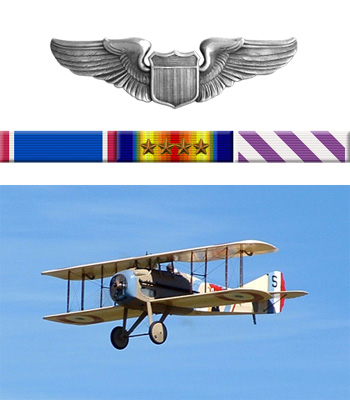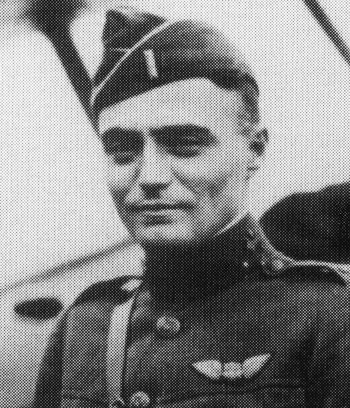Jesse Creech was born on August 22, 1895, in Harlan, Kentucky. He joined the British Royal Flying Corps in 1917, and completed flight training in Canada, and later serving as an instructor pilot in Texas before deploying to France in January 1918. Creech transferred to the Aviation Section of the U.S. Army Signal Corps in February 1918, and joined the 148th Aero Squadron in July 1918. He was credited with the destruction of 7 enemy aircraft in aerial combat before the war ended in November 1918. Lt Creech returned to the U.S. in December 1918, and was discharged the same month. Jesse Creech died on February 16, 1948, and was buried at the Lexington Cemetery in Lexington, Kentucky.
His Distinguished Service Cross Citation reads:
The Distinguished Service Cross is presented to Jesse Orin Creech, First Lieutenant (Air Service), U.S. Army, for extraordinary heroism in action at Cambrai, France, September 26, 1918; south of Masnieres, France, September 28, 1918; and near Jenlain, France, October 28, 1918. Being on enemy patrol on September 26, 1918, when a large number of enemy airplanes were encountered, in the fight that ensued Lieutenant Creech shot down two of the enemy planes and save the commander of the patrol from being shot down. On October 28, 1918, near Jenlain, France, Lieutenant Creech's flight of 5 planes was attacked by 8 Fokker biplanes. In this encounter Lieutenant Creech also shot down 2 enemy planes. On September 28, 1918, south of Masnieres, France, Lieutenant Creech with his flight attacked an enemy balloon and compelled the observers to jump. Enemy troops were then attacked in close formation, causing many casualties and scattering all the troops. In all of these encounters Lieutenant Creech displayed high courage, great valor, and utter disregard of danger. He constantly went to the assistance of members of his flight and exposed himself with great fearlessness, and yet with all displayed keen judgment and tireless energy. He proved himself a leader of unusual ability, and was a constant inspiration to the members of his command.
|



